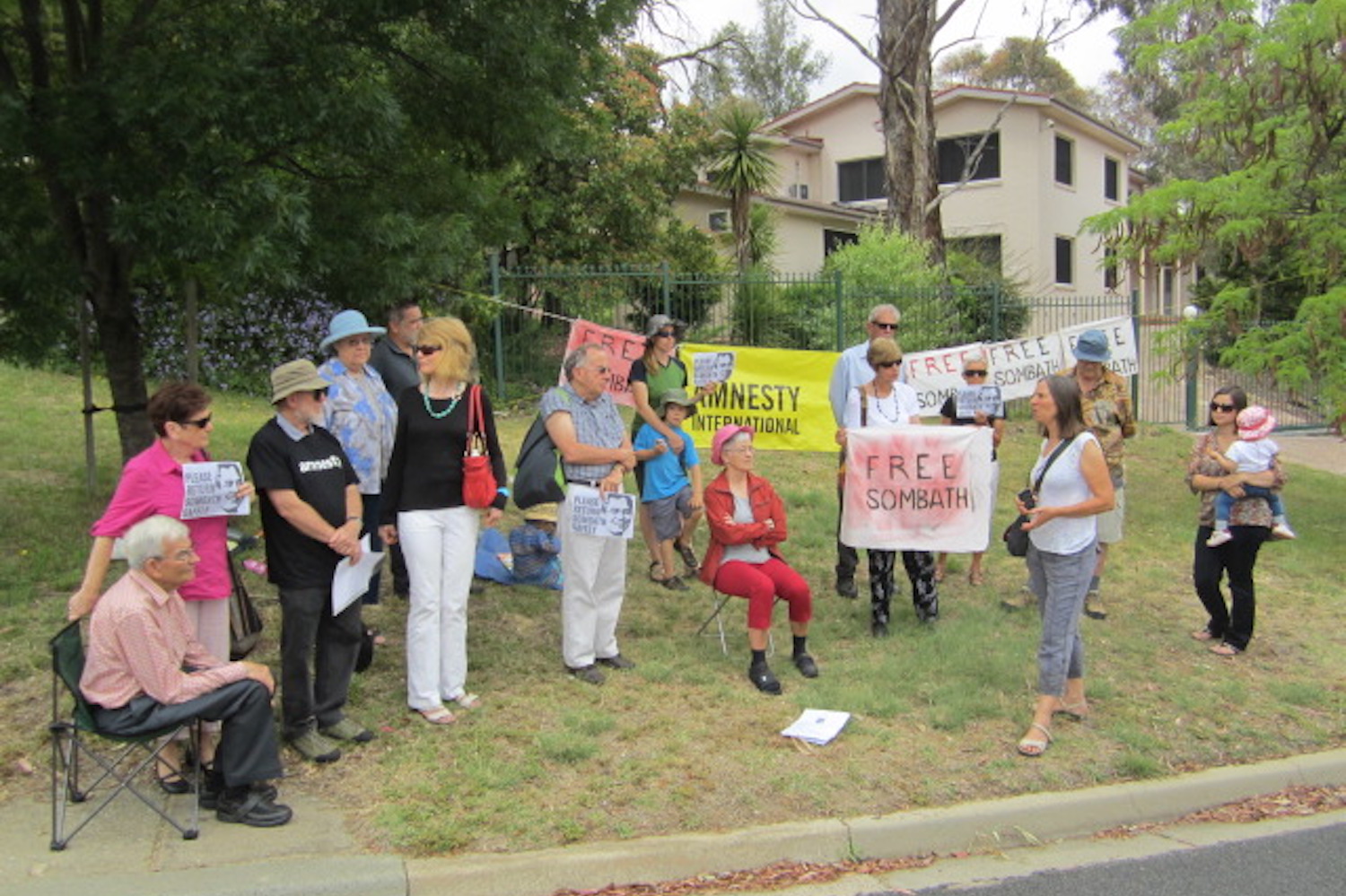“A truly compassionate attitude toward others does not change even if they behave negatively or hurt you.” – H H Dalai Lama XIV
 On 15th December 2013, the Foreign Correspondents’ Club of Thailand (FCCT) hosted Sombath’s wife, Ng Shui-Meng, who spoke on her husband’s life and work. 2 other speakers, Pablo Solon and Evelyn Balais-Serrano joined Shui-Meng to mark the one year since he disappeared.
On 15th December 2013, the Foreign Correspondents’ Club of Thailand (FCCT) hosted Sombath’s wife, Ng Shui-Meng, who spoke on her husband’s life and work. 2 other speakers, Pablo Solon and Evelyn Balais-Serrano joined Shui-Meng to mark the one year since he disappeared.
Sombath Sompone is a well-known and respected member of civil society in the Lao People’s Democratic Republic (Laos). At around 5.30pm on 15th December 2012, he left in his car from his office in Vientiane, the capital of Laos. He was driving behind his wife Ng Shui-Meng, who was in another car. They were due to have dinner together at their home. But traffic’s police stopped Sombath at around 6pm at a police post on Thadeua Road, in Vientiane’s Sisattanak district. According to footage from a CCTV camera, he was stopped in his own vehicle by police, left it, and minutes later got into another vehicle and was driven off into darkness. He never made it home.
 One year on, his fate and whereabouts remain unknown. A veil of silence has descended on the disappearance of the man who in 2005 was awarded the Ramon Magsasay Award for Community Leadership. The Lao government which has denied any involvement in his disappearance, has come under pressure for a credible explanation – which has not been forthcoming.
One year on, his fate and whereabouts remain unknown. A veil of silence has descended on the disappearance of the man who in 2005 was awarded the Ramon Magsasay Award for Community Leadership. The Lao government which has denied any involvement in his disappearance, has come under pressure for a credible explanation – which has not been forthcoming.
Who is Sombath Sompone?
Growing up in a rural and impoverished environment, Sombath was a simple farming boy. By growing rice crops with his family, he understands the challenges of poverty and the joys of simple living. He grew up in the difficult times of war and was refugeed to Thailand at the tender age of 8. In the early 70′s he received a scholarship to study at the University of Hawaii where he received a BA in Education (1974) and an MA in Agriculture (1978).
Returning to Lao after the establishment of the Lao People’s Democratic Republic (Laos), Sombath’s earliest work was to demonstrate methods of sustainable farming and food security. He rejected insecticides and had always pushed for more appropriate technologies.
Sombath was very much inspired by Ajahn Sulak Sivaraksa, Thich Nhat Hanh and the spirit of engaged Buddhism. He wanted to understand the essence of Buddhism as more than the religion he professes and grew up with. He was attracted by the Buddhist teachings on compassion, discovering oneself and the respect for nature and peace. Sombath was also very attracted to the concept of Gross National Happiness (GNH) which is premised on the belief that happiness is the ultimate desire of every individual, and by extension, caters for the holistic needs of the human individual – both physical and mental well being.
His main mission is to bring spirituality back to development. He believes that knowledge and technological concepts is not enough for development. The 3 edges of development – the head, heart and hands are the tools of holistic development.
His philosophy is simple and that is peace, self-reliance and sustainable development. His work involves all segments of society. He is a man who works out differences, avoids extremism and violence of any kind. If he is ever anti-anything, he is anti-poverty that pulls societies down, he is anti-ignorance that closes children’s minds, he is anti no basic access to education, healthcare and drinking water.
For more information and updates, please log on to www.sombath.org.

What is an Enforced Disappearance?
“The arrest, detention, abduction or any other form of deprivation of liberty by agents of the State, followed by a refusal to acknowledge the deprivation of liberty or by concealment of the fate or whereabouts of the disappeared person, which place such a person outside the protection of the law” The International Convention for the Protection of All Persons from Enforced Disappearance.
Considering the background and facts that are currently known, Amnesty International’s research finds that Sombath Somphone has most likely been a victim of enforced disappearance, which is a serious human rights violation and a crime under international law. The organisation concludes that Lao officials are responsible for Sombath’s disappearance. whether through direct perpetration or through complicity, support or acquiescence, in violation of Laos’ obligations under international law.
For more information on Sombath and his disappearance, visit Amnesty International
What is the Buddhist response to this matter?
Ajahn Sulak Si varaksa, has this to share:
varaksa, has this to share:
“….speaking from an article of faith, I believe that Sombath is still alive and have good reasons to believe so.”
“….deep down the people of Lao are still very much committed Buddhists ……… if we honor them, use the Buddhist skillful means, they may soften and come to a positive conclusion”
As such, we must continue all efforts to free Sombath – in a non-violent manner, without anger – in the spirit of compassion. This is the Buddhist way.
We pray that Sombath will soon be returned safely to his family.
We also pray that all victims of enforced disappearances be returned safely, find peace and heart for forgiveness.
